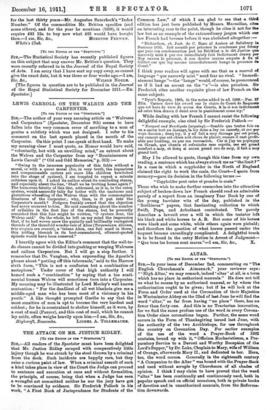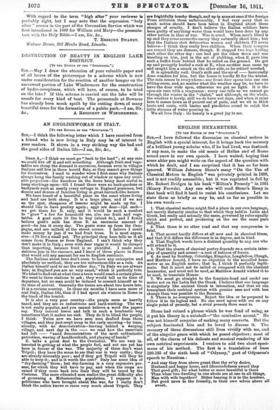ALTAR.
[To THE EDITOR OF THE "Spiscr.reros."1
SIB,—In your issue of December 2nd, commenting on "The English Churchman's Almanack," your reviewer says: "'High Altar,' we may remark, indeed ` altar ' at all, is a term which has no place in authorized manuals." He does not tell us what he means by an authorized manual, or by whom the authorization ought to be given; but if he will look at the Form and Order used at the Coronation of their Majesties in Westminster Abbey on the 22nd of last June he will find the word "altar," so far from having "no place" there, has no fewer than forty-one. And this is no Tractarian innovation, for we find the same profuse use of the word in every Corona- tion Order since coronations began. Further, the same word occurs in the Form of Thanksgiving issued last June, with the authority of the two Archbishops, for use throughout the country on Coronation Day. For earlier examples of the use of the word a Prayer-Book of 1682 contains, bound up with it, " Officium Eucharisticum, a Pre- paratory Service to a Devout and Worthy Reception of the Lord's Supper," by Dr. Lake, Chaplain to Mary, wife of William of Orange, afterwards Mary II., and dedicated to her. Here, too, the word occurs. Generally in the eighteenth century "A Companion to the Altar" was bound with the Prayer-Book and used without scruple by Churchmen of all shades of opinion. I think I may claim to have proved that the word "altar" has been continually and continuously used, both in popular speech and on official occasions, both in private books of devotion and in unauthorized manuals, from the Reforms. tion downwards.
With regard to the term "high altar" your reviewer is probably right, but I may note that the expression "holy altar" occurs in the part of the Coronation Service which was first introduced in 1689 for William and Mary—the presenta- tion with the Holy Bible.—I am, Sir, &c.,
T. ERSKINE SWANZY.
Walmer House, 203 Monks Road, Lincoln.



















































 Previous page
Previous page